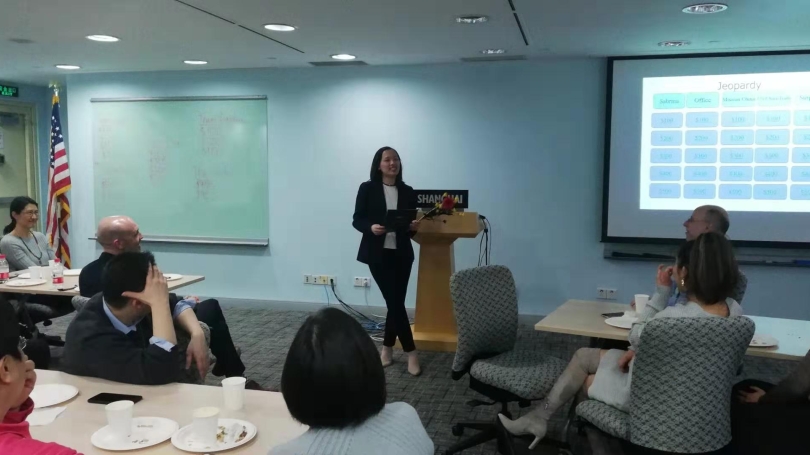
- Public Policy
- Leadership
- Funding
- News & Events
- About the Center
Back to Top Nav
Back to Top Nav
Back to Top Nav
Back to Top Nav
Sabrina Li Shen '21 interned with the Foreign Commercial Service (FCS) at the U.S. Consulate in Shanghai during the 2019 winter term. The following is an excerpt from her internship report.
Over the winter of 2019, I interned with the Foreign Commercial Service (FCS) at the U.S. Consulate in Shanghai. As the overseas arm of the Department of Commerce’s International Trade Administration, FCS’s mission is to facilitate trade relationships between the U.S. and foreign countries— in this case, China. FCS is charged with a variety of responsibilities, including trade promotion, trade advocacy, market research, counseling, etc. FCS works closely with the rest of the U.S. Consulate in each of its overseas posts (every FCS officer is a diplomat), as well as with USEACs (U.S. Export Assistance Center) in every domestic state. In my capacity as an intern, I conducted market research, attended client meetings and various events with the U.S. Consulate and/or FCS, assisted with client matchmaking services and M&A due diligence, entered data in Salesforce and Excel, created brochures and flyers for industry events, and wrote, edited, and translated official documents.
During the first three weeks of my time in China, the U.S. government was locked in a shutdown. Much of the daily work of the consulate and FCS ground to a halt, and my colleagues at work exuded palpable uncertainty and frustration with the fact that they could not do their jobs and did not know when they could resume doing their jobs. I shared their uncertainty and frustration, but I admired by the grace and professionalism with which they handled the shutdown. I also felt inspired by my colleagues’ clear desire to return to work and the dedication they showed to doing as much as they could for our clients even in the midst of a shutdown. I took advantage of the slower pace at work to study SOPs, mission statements, and generally worked my way into a deep understanding of the U.S.-China trade relationship and the role that FCS plays in that relationship. In addition, I had the opportunity to form genuine, lasting connections with my colleagues. I gained troves of industry and economic knowledge by listening to them talk about their work and asking them questions about their industries— questions which they had the time to answer in detail and with nuance.
In a similar vein, the officers never failed to give me challenging assignments. I felt like I was constantly out of my comfort zone— but in my learning zone, not my panic zone. I have no background in economics, but much of my work was related to economics as a result of the nature of FCS. With the support of my colleagues, I believe I rose to every challenge and learned more with that hands-on experience than I ever could by only reading a textbook. More importantly, my confidence in my ability to take on unfamiliar tasks soared.
I gained invaluable experience over the course of my internship, in the form of not only skills and knowledge but also in networking, career guidance, and a nascent but fiery passion for international relations and diplomacy. These experiences have helped steer my academic work onto a more fulfilling path. I am now confident in my motivation to concentrate in IR in the government department and to continue my Chinese language learning. Without a doubt, this internship was the best opportunity and learning experience I have had so far during my time at Dartmouth, and I thank the Rockefeller Center once again for making my off-term possible.
The Rockefeller Internships Program has funding for Dartmouth undergraduate students to help defray the cost of living expenses associated with a full-time, unpaid, leave-term internships in the fields of public policy, public affairs, and social entrepreneurship.